- Home
- Susanna Kearsley
Named of the Dragon Page 9
Named of the Dragon Read online
Page 9
Our eyes locked, while he weighed the challenge. ' 'No, you're right," he said, at last. "I don't. You'll have to read where it lies." I caught the smugness in his smile, and knew he knew I'd rather die than visit him at home. "You can come tomorrow morning, if you like."
"Good," said James. "That's all arranged, then. Anyone for wine?''
Gareth declined the offer. "Why," he asked me, "do you want to know about the prophecies?"
I didn't have a chance to answer. From the floor above a sound rose sharply, unexpectedly, demanding our attention.
Elen's baby was awake, and crying for his mother.
XI
For if there ever come a grief to me
I cry my cry in silence, and have done;
None knows it.
Alfred, Lord Tennyson, "Guinevere"
I reached for my wineglass to hide the effect that the sound was producing. Please stop, I begged silently. Oh, please stop crying. My fingers clenched convulsively around the glass's fragile stem, and snapped it as I drank.
"Oh, blast!" I leaped too late. The dark red wine spilled down my left side to my lap, an ugly spreading stain.
"White wine," said Bridget quickly. "I remember reading somewhere if you pour white wine on top of red, the stain won't set. Do you have any, Elen?"
"No, I'm afraid I—"
James cut in to say there ought to be a bottle or two in his uncle Ralph's dining-room. "Look in the drinks cabinet, under the window."
I stood, grateful for the opportunity to leave the room, to leave the house, to leave the crying baby.
"Shall I come with you?" asked Bridget.
I shook my head. "No." Overhead the crying rose again in volume, grew more piercing and persistent, and my hand shook as I set my napkin down beside my plate. "No, I'll be fine. I'll be back in a minute." I managed to walk, very calm, from the dining-room, my footsteps firm and even on the flooring, like a soldier making an honourable retreat. I didn't start running until I reached the lawn.
In the front porch of the larger house, I pulled the door shut and leaned against it, steadying my breathing. The crying couldn't reach me here—I only heard the rattle of the windowpanes above the covered coal box, and the scuttle of a bit of leaf across the chequered floor. Relieved, I closed my eyes and felt my heartbeat settle. There, I thought, that's better. I can manage.
Upstairs, I changed clothes and spent some minutes in the bathroom, pressing the cold dripping flannel to my cheeks until the face in the mirror looked less flushed and more like my own. I was letting the water run out of the wash basin when I heard a faint creak from the landing outside.
I half-turned my head. "Is that you, Bridget?"
No one replied.
Reaching for a towel, I blotted my face dry and opened the door, peering out. "Hello?"
No one was there.
But when I went downstairs a minute later, carrying my red-stained blouse, I found Bridget in the kitchen, making a systematic search of the cupboards. "You were taking so long," she explained. "I just thought I'd come see if you needed a hand. You've got the blouse, have you? Good. We can use the washing-up bowl, it should be clean enough."
"You weren't just upstairs, were you?"
"No. Why?"
"I thought I heard something."
"Well, you know old houses. They're always... ah, here we are." Triumphant, she held up a bottle of white wine.
I looked at the label. "Oh, Bridget, we shouldn't use that one."
"Why not?"
"It's Bordeaux, that's why not. What we want is a table wine, not so expensive ..."
But she was already applying the corkscrew. "Wine," she said firmly, "is wine." She stuffed my blouse into the tub and upended the bottle, her gaze sliding sideways to study my face. "It wasn't because of the baby, was it?"
"Sorry?"
"That this happened," she elaborated, nodding at the sodden blouse, now bleeding streams of pink. "Because if the baby is bothering you, then I want you to tell me. I really didn't think that he would be here, honestly I didn't, and I don't want you having a miserable Christmas."
"I won't have a miserable Christmas," I promised her.
She tipped back the bottle in time to save some of the wine. "Good. Then let's have a glass each of this and get back to the party. I'll need you to keep James diverted," she said with a wink, "while I'm talking to Gareth."
*-*-*-*-*
I fought the need to sleep.
It wasn't that I was afraid to face the dream, but after this evening at Elen's—with Stevie crying on and off upstairs and Gareth jabbing at me all night with his pointed little comments about Londoners and agents—after all that, my nerves felt quite raw and exposed, and the last thing I needed to see was the blue woman coming towards me with child in tow.
Instead I propped my pillows firmly up against the headboard and began to read. I didn't often read for pleasure, but in a bookcase in the dining-room downstairs I'd found a paperback copy of Wilkie Collins's The Woman in White, a long-forgotten favourite and the perfect book for keeping me awake.
I'd never managed to unveil the trick of Wilkie Collins's prose. It was, on the surface, as heavy and laboured as one would expect from the pen of a stalwart Victorian, laced with descriptions of trivial things, the sentences strung out with commas and colons until they became full-page paragraphs. But underneath the ornate style lay something, some force that compelled me along like a hand at my back, and I found it impossible, once I had started, to put his books down.
It was light when I finished.
Not full light, but rather the fiat grey suggestion of dawn that precedes it. The moon, fighting hard to hold on to its reign of the sky, had dug in its heels at the edge of the tower and hung there, a glimmering disc of pure white. The little morning star was there as well, looking down on me, watching and waiting. It looked small and cold, and my limbs felt an answering chill. By now I had gone beyond tired, to that fuzzy-edged, cobwebby level of consciousness that falls between sleeping and waking and makes doing either impossible. But the ache in my legs called for movement.
I dressed and went downstairs with the thought of making tea, but trying to move quietly around that sleeping house proved to be difficult—each floorboard had its own small voice, the cupboard hinges creaked, and when I turned the taps the water thundered through the pipes so forcefully it seemed to shake the walls. It was safer, I thought, to forget about tea. I put the kettle down again and went to fetch my coat.
Outside, at least, I didn't run the risk of waking anyone. If I stayed off the gravel and kept to the grass, my footsteps made no noise.
At the foot of the drive I turned west this time, setting my back to the tower and the reed-filled estuary to follow the curve of the lane that would lead me out on to the main village street. We had taken this lane coming home from the pub, Friday night, but I hadn't yet walked it in daylight. Not that it was daylight now—the sun was little more than a faint spreading stain of pink above the bay behind me. Still, the chilled blue dawn gave light enough to see by.
To my left a faintly worn footpath struck a course across the rough grass, through a kissing gate set in the old rail fence, to a small, tidy park with a playground for children. I felt' a small tug deep inside at the sight of the dangling baby swings and I quickly turned to look the other way, to where the still-green pasture sloped uphill to meet the ploughed and narrow fields of reddish soil. They looked like potato fields, to me, but I wasn't certain. I must, I thought, remember to ask Owen what they grew down here, in Angle; what crops would thrive so close beside the sea.
A mingled scent of salt and seaweed, not unpleasant, clung damply to the morning breeze that touched my upturned face, and I closed my eyes a moment, breathing deep. The air itself was like a tonic, cleansing all the grime and weariness of city life away, and in my ears the rush and murmur of the waves against the shore sang like the soothing calm refrain of some old song, forgotten once, and now remembered, haunting in
my mind. I filled my lungs again, absorbed in the sensation. So absorbed, in fact, that by the time I heard the sound I could do little to react.
It was a strange sound, soft and snuffing, like a small pig rooting in the wet grass at my feet. I opened my eyes and looked down. The wiry little terrier, more brown than white now, splattered with mud, tilted up his fox-like face and laughed at me, his stump of a tail fiercely wagging. I quickly glanced in all directions, but could see no sign of Gareth Gwyn Morgan. The dog was apparently walking alone.
"Good morning, Chance," I greeted him, and bent to scratch the perked-up ears. "Where's your nasty master, then? Where is he?"
The dog angled his head to the right, then the left, as all dogs do when trying to make sense of speech. Giving up with an uncannily human shrug, he turned in the lane and looked back, expectant.
"Yes, well, I was heading that way to begin with," I told him. "You're welcome to come if you like."
He didn't really keep to heel. His little legs moving a mile a minute, he bounced before me like a blind man's cane, investigating everything. As we rounded the comer, just yards from the street, he veered suddenly left and went straight into someone's back garden, to sniff round their dustbins.
"Chance!" I hissed, trying not to wake the neighbourhood. "Get out of that!"
It had about as much effect as tugging on a giant's sleeve. Ignoring me, he moved a little further round the bins, clearly intrigued by whatever he smelted.
"Chance, for heaven's sake." I stopped and stood, uncertain, while the windows of the pink cottage attached to the garden gazed down on me in silent accusation. "Come on," I urged the dog, and when he shrugged me off a second time I gathered up my courage and went after him.
It was not, I decided, the most equal of struggles. For something so short-legged and muscle-bound, the dog could move like lightning, and he seemed to view the whole thing as a jolly sort of game—three circles round the dustbins, then a pause, and round again the other way, tail wagging with such energy I feared it might fall off. When I tried to head him off he dodged, and knocked one bin over with a dreadful clatter.
It rolled, but to my great relief, the lid stayed on. "You're lucky," I informed the terrier, who didn't look at all contrite as he watched me bend to chase the rolling dustbin. I'd nearly got it upright when the back door of the cottage opened. Chance woofed and scarpered, leaving me alone to face my fate, but before I could turn round a dry voice stopped me.
"There's a man comes on Tuesdays to deal with those, thanks all the same."
I hung my head. "Oh, bloody hell." In a burst of frustration, I wrestled the dustbin back into place and wheeled to face Gareth Gwyn Morgan.
He stood square in the doorway, arms folded, stone-faced. "Are you sure you're not a journalist? That's just the sort of thing that lot go in for, searching people's rubbish."
I set my teeth, refusing to give him the satisfaction of a reply. Instead I merely sent him what I hoped was a defiant look, and turning on my heel, prepared to leave. Behind me, Chance whined sharply and I heard the heavy conflict in his master's exhaled breath.
"Miss Ravenshaw."
I stopped, not looking back, and he continued.
"Would you like to come inside?"
It seemed so unlike him to offer that my head moved of its own accord. I stared at him. "Inside your house?"
"That's where I keep my books," he said. "And you were rather keen, as I recall, to read the prophecies of Merlin."
"The prophecies..."
"I did tell you that this morning was convenient," he went on, his gaze flicking upwards to scan the spreading pinkish stain that wanned the dawning sky. "And this is definitely morning."
He was daring me again, I thought, and his next words confirmed it. His dark eyes deliberately free from expression, he curved his mouth into the ghost of a smile. "Or are you too afraid to spend an hour in my company?"
I raised a steady eyebrow. "And why would I be afraid?"
"Why indeed?" he asked, and stood aside, inviting me to step across the threshold.
XII
Sometimes he angers me
With telling me of the moldwarp and the ant,
Of the dreamer Merlin and his prophecies,
And of a dragon ...
William Shakespeare, Henry IV, Part One
The plastered stone walls of the cottage breathed cold down the back of my neck as I came through the door.
"You'll want to leave your jacket on," was Gareth's curt advice. "I'm not as civilized as your friend Swift, I don't have central heating. And the Aga's decided to be a right bastard this morning."
I tended to think of an Aga as something one found in a Home Counties kitchen, expensive and gleaming, its colour selected to match one's collection of Le Creuset pots, but here in Gareth's square and spartan kitchen, the cooker had no such pretensions. It looked ancient, for one thing— its solid, cream-enamelled bulk wedged in the nook where the old hearth had been, black stovepipe disappearing up the chimney. The rectangular stove lid had been levered upright on its hinges to expose an iron hob that years of use had reddened round the edge, and at the front, to the right of the ovens, the fire box stood open, with its cover removed and a few wads of paper stuffed into the smouldering coals. From the piles of cold ash and spent matches that littered the brick hearth, it appeared that he'd been battling with the Aga for some time.
"And you, my lad," he told the little dog, who'd bent to sniff the ashes, "can keep your big nose out of that. I've no desire to spend my morning cleaning up your mess."
After my own experience with the dustbins, I couldn't help smiling. ' 'What kind of a dog is he, anyway?''
"The bloody-minded kind," he said. "A long-haired Jack."
"A Jack Russell terrier? Really? I didn't know they could have long hair."
As if to prove the point, Chance gave his body an all-over shake so his wiry white hair stood out in all directions, making him look more like a mad scientist than ever, before he padded past us on his stubby legs to peer with hopeful eyes into his food dish.
"The walking stomach," Gareth said. "You've had your breakfast, Chance, there's nothing for you there. Why don't you show the lady where we keep the books?"
At that last word, the dog perked his ears up and cocked his head sideways, then gave an acquiescing woof and trotted back across the kitchen, past the narrow bare oak table to a partly open door. The room beyond had, I imagined, been intended as a dining-room, but Gareth Morgan didn't look the type to entertain. Instead, the dark walls had been hidden behind an assortment of bookcases, most of them old, some with glass doors, some painted, all crammed with a varied collection of volumes. Underneath the only window, facing out on the back garden, an impressive roll-top desk and chair provided what appeared to be the only place to sit, and I didn't need to see the scribbled paper, open books, and scattered pens to know that this was where the playwright worked.
Gareth walked over to switch on the desk lamp, dispersing the studious shadows.
For a moment it occurred to me I really didn't need to read the book of Merlin's prophecies—I already knew how they'd worked their way into my dream. It was all Lewis's fault, for giving me so many lectures on bloody Welsh history, I thought. Small wonder my subconscious had picked up the phrase. But still, there remained one small part of the dream that I couldn't explain, and I'd become something of a fanatic when it came to interpreting dreams. I liked to know where every symbol came from, what it meant.
Gareth flipped his papers upside-down and turned the chair towards me. "Have a seat."
I sat, exhaling an experimental breath to see if it made mist. My nose felt numb with cold. Thrusting my hands deeper into my pockets, I pressed them to my knees and watched while Gareth, looking quite comfortably warm in a thick Irish jumper and black denim jeans, bent to scan a bookshelf.
He was not, I admitted, a bad-looking man. Not a handsome one, in the traditional sense—he would need to be taller for that, an
d less angry, his features more even. But as he looked now, leaning forward in profile, the crisp black hair flopped on his eyebrow to soften his frown, I could understand why Bridget thought him "prime."
"Here it is," he said. "Geoffrey of Monmouth." He pulled a small volume from one of the bottom shelves. It had been through the wars, that book. The spine was torn, and the pages had started to shift and come loose from their binding. Gareth turned them with care, as he straightened. "It's not the most trustworthy history of Britain, but good for its time. He's the one who goes on about Troy."
"Troy?"
"Mm. Brutus the Trojan," he said, more specifically. "Great-grandson of Aeneas, the great Trojan war hero."
"As in Virgil's AeneidV'
"Exactly."
I looked at him, curious. "What does that have to do with British history?"
"Everything, if one believes Geoffrey of Monmouth.
The tale goes that Brutus got tired of fighting the Greeks, and on the advice of the goddess Diana set sail with a small group of Trojans and ended up settling here. Built a new Troy where London is now, spread his seed, and became the first ruler of Britain."
"You're joking."
He shrugged, and turned another page. "It's no less strange than any other legend. I assume it's just the prophecies you're after, not the bit about Vortigern's tower."
"Whose tower?"
"Vortigern." I must have looked a blank, because he sighed. "The British king who dug up Merlin in the first place."
"Ah. I'd better start with him, then."
"Right." He set the book in front of me and pointed to the place. "That's where it starts."
He didn't move away, as I'd expected, but stood firm by my shoulder, his frown pricking warmth down the back of my neck. I read the first sentence, and read it again... and a third time, but it wasn't any use. I couldn't concentrate. Not when I felt like a mouse being watched by a hawk. I set the book down; glanced up sweetly. "If I promise not to bend the pages back or mark the margins, will that set your mind at ease?"

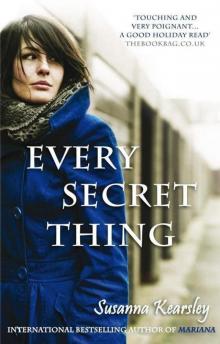 Every Secret Thing
Every Secret Thing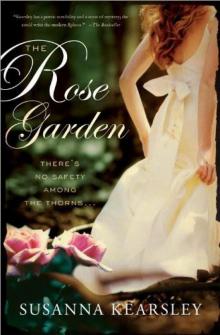 The Rose Garden
The Rose Garden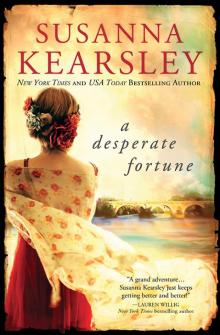 A Desperate Fortune
A Desperate Fortune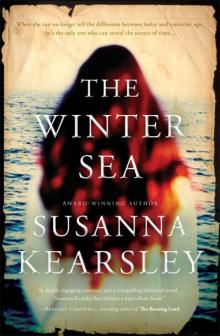 The Winter Sea
The Winter Sea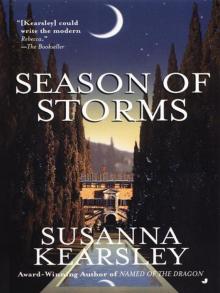 Season of Storms
Season of Storms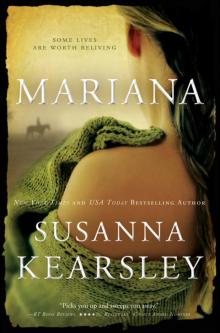 Mariana
Mariana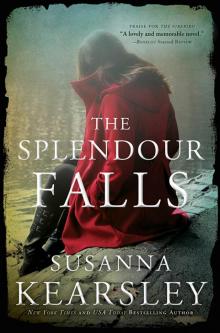 The Splendour Falls
The Splendour Falls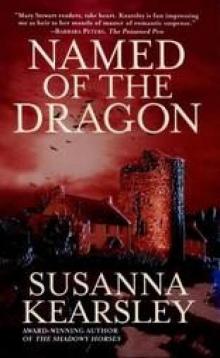 Named of the Dragon
Named of the Dragon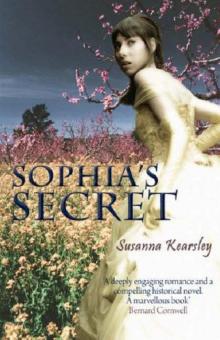 Sophia's Secret
Sophia's Secret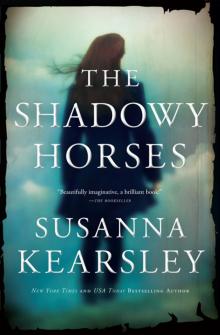 The Shadowy Horses
The Shadowy Horses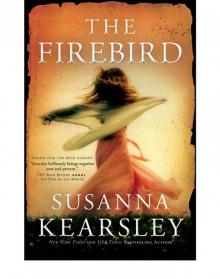 The Firebird
The Firebird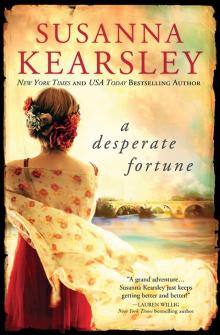 Desperate Fortune
Desperate Fortune